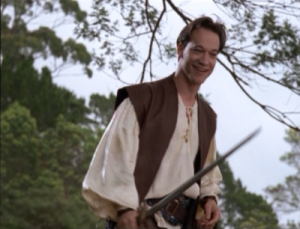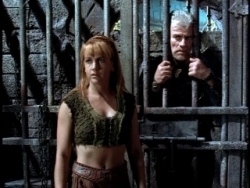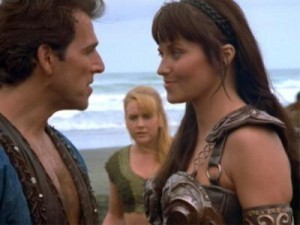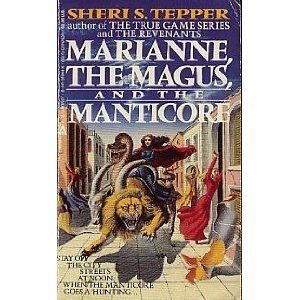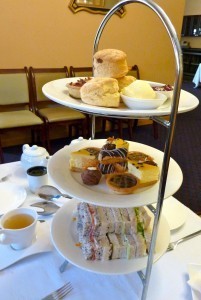Tansy Rayner Roberts's Blog, page 152
December 5, 2010
Science fiction, and women, and lists, and plots.
It's Women in Science Fiction week over at Torque Control – Niall Harrison has been blogging about his personal top 10 female-authored SF books of the last decade and will shortly be compiling the results of a poll to answer the same question. My list, you might recall, was posted back here. Okay, that was the cheaty list of 15 before I whittled it down, but there is no overlap at all between his list and mine! Worst of all, I haven't even READ any of the books on Niall's list, not even Life, or Living-Next-Door-To-The-God-Of Love or Maul, which had been on my To Read list since it was first published.
I was determined to read at least three of the 2010 SF-books-by-female-authors-published-in-Britain list by now, and have only managed one, Feed, which I will be reviewing later this week.
In fact my plan is to blog something about women & science fiction every day all week, in solidarity with Torque Control, and also to revive my flagging bloggity spirit of recent months. I have several posts planned, some reviews, some stuff-I've-been-thinking, mostly thanks to doing lots of driving today while listening to Jonathan, Gary, John Clute & Cheryl Morgan talk about crunchy science fictional critic type things. So stay tuned!
If you're blogging in any way about women & SF this week, deliberately or just because it's a most excellent thing to blog about, drop me a link in the comments! I'd love to read what you're writing, and I'll try for a links round up on the weekend.
December 1, 2010
On Work, and Work, and the end of the Working Year
So that was November, then…
I was pleased that I managed to make the month so productive, despite the urge to collapse in a heap in the wake of finally, finally, finally finishing the draft of book 3 (which it appears is most likely to be titled Reign of Beasts). Thanks to my List of Doom, I kept writing, putting together a draft of a publishing proposal for Fury to be polished up in the New Year, I started editing Blueberry again, which is going to be my summer project, I read books which had been archived on my shelves far too long, and I sewed – bookmarks for a friend's commission, finishing the top of a baby quilt, and the beginnings of a new crazy quilt.
And you know, in the midst of all that I pushed through my copy edits for The Shattered City (Book 2), and prepared for & taught a one day course on writing fantasy novels.
One of the items on my list was to write a short story. Originally I had another plan for that, but then Alisa went and rejected two stories from a project we were doing together, which left me having to start from scratch! (In a good way. I am hugely excited now about what I'm doing, and she was totally right to kick those stories to the curb. Good enough is totally not good enough.) One of those stories is now done thanks to the List of Doom, and I have to write the other as soon as I can. I'm in a weird in-between-professional-deadlines space right now, where I don't know where the next deadline is coming from. I will receive proofs for Book 2 and structural edits for Book 3 at SOME point, and everything will have to be dropped to do them, but I don't know when. All the more reason to polish off my other necessary jobs ASAP, especially as I only have another fortnight or so before the school holidays hit, and there's no such thing as a truly productive work day until late February.
But in any case, I did my not-Nano November, and while I never got up the high energy equivalent to writing 50K (as it turned out, writing about 5-6000 words as part of smaller projects was my limit) I managed to complete 34/35 items, and that last one was a crazy quilt square that I could have polished off at the last day if I'd dropped everything to do it, but I couldn't quite bring myself to prioritise that way.
Once I get this last story done, which I have been plotting and replotting in my head so it's just about ready to burn up the page, I am officially free of commitments, and I would love to have a little of that freedom before I get publisher deadlines again – one thing I have learned this year is that you can't use ALL the time you have until the end of a deadline, as other things are always turning up to compete, usually in the last two weeks. I've always been one to start slowly and build up momentum to rip through the work at a high pace in those last couple of weeks, and so the stop-start-stop-start work pace this year has thrown me for a loop more than once.
I honestly thought I would never get to the end of Book 3. I seemed to be constantly one month from getting it done, and every time I had to stop and start again, I lost momentum and had to "waste" time scrabbling around and getting my zone back, only to be interrupted with a new urgent task as soon as I got up a decent head of steam.
The best decision I made all year was when those copy edits for book 2 arrived in October and I begged to put them off three weeks or so, so I could get book 3 DONE. Even though technically Book 2 should always be prioritised over Book 3, I had been doing that all year and honestly thought if I stopped writing Book 3 one more time, I wouldn't be able to get started again. Luckily thanks to the prior rescheduling of Book 2's publishing date, there was plenty of time to be able to shuffle things that way, and I will always be grateful that my editor let me do things that way. As it turned out, once I sent off Book 3, I was able to get through the copy edits a week earlier than my revised deadline, because they were so surprisingly light – the second structural edit that had so thrown off my schedule earlier in the year had, it seemed, saved time and work at this end. Hooray!
Last year I was writing, writing, trying to get well ahead of my official deadlines because I had my own little bundle of distractions due to be born in August and throw my life into delightful disarray. This year, instead of fighting to get ahead, I was fighting to keep up, because there was this adorable little baby here, cuting for my attention. Plus that big girl, who was nicely packed off at school 5 days a week, but who came crashing back into my life at 2:30 every day unless I had negotiated for someone else to distract her for an hour or two.
Here I am, nearly at the end of the year, nearly able to draw a line under my year's professional commitments, with two (cough, possibly three) books coming out in 2011. I made it! And yet my biggest achievement for the year feels like it is making friendships with the other parents at school, and my biggest regret is that I didn't do more in the way of parent help, paying attention to what was going on in Raeli's classroom. It's been a hugely disruptive year, thanks to the constant shifting of teachers in and out of their class, and while I have been able to pick up on a lot of the potential problems and issues thanks to communication with other parents, I can see the value now in being inside the classroom and forming a relationship with my daughter's teacher early on in the year – because you really can't guarantee that the communication they offer is going to be remotely sufficient.
I think I've done a pretty good job of balancing everything, all in all. I've made a few assemblies over the year, and turned up to the essential events, the athletics carnival and book week parade, while also dodging out of several (excursions, the cross country, and so on) but I'm really glad that I was able to take some of the pressure off myself in the last few weeks about making the most of every-single-child-free-hour, going along to Raeli's swimming classes, taking the baby to meet Raeli and her class at recess in the middle of their museum excursio, and volunteering to go in next week to help them bake shortbread while Jem is in daycare.
I really didn't expect there to be so much expectation about parent participation in the school, and while I don't think it's fair to expect quite so much from parents, I can also see the value that the class reaps directly from some parents being able to volunteer and help out. I do have work commitments and can't afford to get too guilty about what I'm not doing, but I can see it makes a difference to my daughter when I am able to give what time I can, so I want to do more of that next year.
I am regularly reminded of John Howard suggesting that all mothers should be back in full time work the second that their children turn 5 which is why family allowance should stop at that point, and I kind of want to punch him retrospectively – without parental volunteering, fundraising and behind the scenes admin, our lovely little community school would not have well tended grounds, sports equipment, a canteen, a uniform shop, or a good half the current artistic, crafty, cooking & excursion-type activities. Parents also help with reading practice every week. There are an awful lot of school costs which the government is not helping with at all, and it's the participation of the community that makes Raeli's school such an awesome one.
Hmm, I think I got sidetracked there. But ultimately, my big discovery for this year was that balancing mothering and professional writing was not just about snatching time from my 24 hour mothering to work, but also snatching time from my work routine in order to value-add to my mothering.
This is not intended to be a slight on any of the hard working parents who don't or can't volunteer to participate in school activities – I would be the absolutely last to criticise any parent for making the most of those precious, precious child-free school hours. But I am lucky in that I have more flexibility than most in my work routine, and I have got to a point where I feel I need to train myself out of dropping my children and running away every time I get a chance to do so. They're only going to be young for so many years, and much though I want to have a huge shelf of books with my name on to mark my progress through the next decade, that's not all I want.
And I can have it all, right?
[yes, yes, Alisa, going to write that short story now...]
November 28, 2010
My Sword is Always Ready to Pleasure You [Xena Rewatch 2.16-2.19
This is the episode that really shows what Ted Raimi can do – a homage to Danny Kaye's classic performance in The Court Jester, it sets up a situation where Joxer is charmed to become a Hero with a capital H every time a bell rings – and then returns to his own bumbling self when it rings again.
Ted Raimi carries the story off with aplomb, making it that bit more special than its Hercules-lite plot really deserves, and his 'swashbuckling hero' persona is both hilarious and weirdly convincing.
Also, damn that man can fence.
This episode also marks the first appearance in Xena of the goddess Aphrodite played by Alexandra Tydings, whose bubbly, bitchy surfer babe persona was one of the highlights of the Hercules series from quite early on, along with her cranky, who-oiled-those-chest-muscles, bleached blond son Cupid, played by… um, Karl Urban.
One of my favourite things about the Herc-and-Xenaverse is the way that the same actors appear over and over, often playing several different characters. It lends a certain theatre rep feel to the whole production, and there is great fun to be had in spotting the reappearance of a favourite performer. Sometimes an actor used in a minor role is cast later in a major or more iconic one (Lucy Lawless and Renee O'Connor, for example, both played less significant roles in the Hercverse before being cast as Xena and Gabrielle) and often it ends up that the same actor plays a different major roles in each "verse". The actress who plays Gabrielle's sister, for instance, has a recurring role as the daughter of one of Hercules' Argonaut friends, and Gina Torres appears as Cleopatra in the Xenaverse, and pirate/Sumerian queen Nebula in the Hercverse.
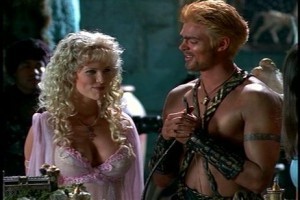 The really cool part is that the production crew often chose to bring back favourite characters regardless of who played them, and also switch Herc & Xena supporting characters into the other show. Sometimes they would quite slyly juxtapose one performance up against another – like bringing Hercules' Cupid into the Xenaverse only a few episodes after Karl Urban tore up the screen as Xena's Caesar! In some cases, as with Cupid, the character did not noticeably change in the transition from Herc to Xena or vice versa. With others – like Ares and Aphrodite – the show enabled different relationships and aspects of the character to be emphasised.
The really cool part is that the production crew often chose to bring back favourite characters regardless of who played them, and also switch Herc & Xena supporting characters into the other show. Sometimes they would quite slyly juxtapose one performance up against another – like bringing Hercules' Cupid into the Xenaverse only a few episodes after Karl Urban tore up the screen as Xena's Caesar! In some cases, as with Cupid, the character did not noticeably change in the transition from Herc to Xena or vice versa. With others – like Ares and Aphrodite – the show enabled different relationships and aspects of the character to be emphasised.
While I enjoy getting to squee at the ridiculous outfit they put Karl Urban in, for me the exciting part of this episode is actually getting to see Gabrielle and Aphrodite perform together for the first time. The combination of those two characters (often with Joxer in the mix) was comedy gold, and the partnership was used over and over to great effect when a Xena-lite episode was necessary.
Oh and – first appearance of the Joxer the Mighty song! Though not yet bearing my favourite verse about Gabby the sidekick fighting with her little stick… stay tuned for that one.
Gabrielle is reunited with her old friend Meleager the Mighty, and is stunned to find him accused of murder, due to be executed. While she runs around madly trying to prove his innocence, Xena is more cynical. This feels like an average Xena 'find the bad guy, solve the twist' kind of story, but it has some rather crunchy themes tucked in between the average. When Xena gently tells Gabrielle that her friends can't always live up to the pedestal she puts them on, she doesn't only mean Meleager, but herself.
There's also a firm reminder that Xena has long escaped justice for her crimes, and she is well aware of the hypocrisy of her own current quest to bring justice to others.
Tim Thomerson plays the elderly, alcoholic warrior with grace and poise, and is particularly good with the dramatic material in this episode. Not only is his paternal love for Gabrielle clear, but he and Xena bounce beautifully off each other – you can see that they both recognise the dark warrior side in each other, something Gabrielle still remains innocently unaware of.
But mostly the episode is notable for the camera shot of Xena catching an arrow in her teeth.
2.18 Blind Faith
AKA the one where Brian from Police Rescue acts like a right little thug. Man, I loved Police Rescue. It was really the best show EVER. I wonder if it's available on DVD…
 Eh, anyway. Xena gets attacked by a thug with delusions of grandeur, Gabrielle gets kidnapped by some people who want her to marry a hot king (and makes the first crack about how all the boys she gets serious up end up dead, all TWO of them, Gabrielle, you're creating your own fake mythology here), but the whole thing is a set-up to show how Xena can still be awesome without her eyesight.
Eh, anyway. Xena gets attacked by a thug with delusions of grandeur, Gabrielle gets kidnapped by some people who want her to marry a hot king (and makes the first crack about how all the boys she gets serious up end up dead, all TWO of them, Gabrielle, you're creating your own fake mythology here), but the whole thing is a set-up to show how Xena can still be awesome without her eyesight.
In the midst of a fight, Xena gets herself doused with Oil of MacGuffin which conveniently blinds a person temporarily unless they leave it untreated for 24 hours. Determined to save Gabrielle at the expense of her own sight, she tows a captive baby warlord around and bonds with him while using him as her seeing eye dog.
Jeremy Callaghan, playing the thug with a heart of gold, pretty much spends the whole episode auditioning for the far greater role of Pompey, next season. And a good thing too. He is my very favourite Pompey. I loved him as Brian, too. Did I mention Police Rescue was an awesome show? I'm very excited Gary Sweet is going to be in the movie of the Dawn Treader…
AKA the one with Krieg from SeaQuest, back when SeaQuest was awesome, which was sadly only season one, before they fired all the actors over 30 and repopulated the sub with teenagers. But it was a really good season. I wonder if it's on DVD…
Despite the highly irritating choice of the Roman name 'Ulysses' over the Greek 'Odysseus' (yeah, yeah, anything BC is good) I rather like this one. It combines several important elements of the Odyssey and refers to many more. In particular, the use of Xena's own singing chops to circumvent the Siren song is lovely, as is her involvement in the drawing of the bow. Bonus points also that they came up with a story to use the watery figure of Poseidon who had been in the credits since Season 1 but never actually appeared in a story.
I love the way so many episodes refer back to Troy as a defining event in this world – and that there is no attempt to separate Ulysses from his baggage and backstory, as they grossly simplified the Trojan saga back in "Beware Greeks Bearing Gifts Instead, the complex backstory is embraced with fervour. The ship set is gorgeous – I love the use of ships in Xena, even if it's probably the same set used over and over.
On a far more lighthearted note, this is the first time we see Gab get seasick, a character trait that is embraced and elaborated upon in future episodes.
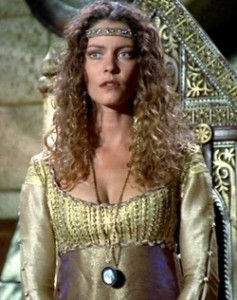 But I want to talk about the romance for a minute here. Xena's love stories are rare, though it does happen to her more often than Hercules, which is interesting in itself! In this case, she and Ulysses fall for each other and hook up while he believes Penelope (Gaby Willis from Neighbours, remember her?) to be dead, and then Xena has to take responsibility for reminding him he should be with the wife he hasn't seen in more than a decade. It's not overly believable that she should have fallen in love quite so quickly but Ulysses is a fairly convincing figure of attraction for Xena once you get past the whole 'Krieg' aspect – he is a strong, independent fighter who values her own fighting skills, works well at her side, and has a snarky sense of humour along with a hint of a tragic past. He could have been designed for her…
But I want to talk about the romance for a minute here. Xena's love stories are rare, though it does happen to her more often than Hercules, which is interesting in itself! In this case, she and Ulysses fall for each other and hook up while he believes Penelope (Gaby Willis from Neighbours, remember her?) to be dead, and then Xena has to take responsibility for reminding him he should be with the wife he hasn't seen in more than a decade. It's not overly believable that she should have fallen in love quite so quickly but Ulysses is a fairly convincing figure of attraction for Xena once you get past the whole 'Krieg' aspect – he is a strong, independent fighter who values her own fighting skills, works well at her side, and has a snarky sense of humour along with a hint of a tragic past. He could have been designed for her…
The idea that Xena is more open to love because of what she has learned from Gabrielle is interesting (and kinda creepy if you have read anything romantic into Gab/Xena in the story so far). But I don't regret Xena losing a chance of love with Ulysses – not once we have the reunion with Penelope, which is one of my favourite classical romantic moments of all time.
Once again, the concept cherished by Gabrielle of the existence of soulmates is raised – Ulysses claims Xena is his soulmate and she does not specifically reciprocate that, though she does later admit to Gabrielle that she might love him. Xena insists that he needs to stay in Ithaka for his people regardless of whether he loves her more than Penelope, which is pretty similar to the argument she used to avoid commitment with Hercules – no settling down for this little black duck!
Xena will have to look elsewhere for a soulmate…
Also, at the end, Xena totally steals his ship. Right? Awesome.
CHAKRAM STATISTICS:
Boys who want romance with Xena: 10
Boys Xena allows to romance her: 4
Xena dead boyfriends: 2
Gabrielle dead boyfriends: 2/7
"Adorable" children: 31
Babies: 4
Babies tossed humorously in the air during fight scenes: 6
Xena doppelgangers: 3
Xena sings at a funeral: 2
Xena dies: 2
Gabrielle dies: 1
Characters brought back from the dead (including ghosts and visits to the Underworld): 13
Ares loses his powers and goes all to pieces about it: 1
Xena or Gabrielle earns money: 1
Xena or Gabrielle spends money (or claims to have money to spend): 5
Out of the Pantheon: Morpheus, Ares, Hera, the Titans, Hades, Celesta, Charon, the Fates, Bacchus, Aphrodite, Cupid, Poseidon
The Celebrity Red Carpet of the Ancient World: Pandora, Prometheus, Hercules, Iolaus, Sisyphus, Helen of Troy, Paris, Deiphobus, Menelaus, Euripides, Homer, Autolycus, Meleager, Oracle of Delphi, David, Goliath, Orpheus, Julius Caesar, Brutus, Ulysses, Penelope
Previous Xena Rewatch Posts:
Warlord is a Lady Tonight
I Don't Work For Money
Amazon Wanna Take A Ride?
Go To Tartarus!
Swashbuckle and Shams
Death In A Chainmail Bikini
Full Moon It Must Be Xena
How Do You Mortals Get From Day to Day?
The Future is Archaeologists
Divide and Conquer
November 26, 2010
China Mountain Zhang (and Manticores)
Marianne, the Magus & the Manticore (1985) by Sheri S Tepper
China Mountain Zhang (1992) by Maureen McHugh
So one of those tasks on my List of Stuff To Do this November was to polish off five books from my 'archived' to read shelf – that's the ones that have ended up on the lower shelf, ignored in favour of new and shiny upper shelf books which Fishpond may or may not have delivered in the last 24 hours. Many books on that lower shelf are those which I ordered or bought second hand for some specific reason, and then failed to be in the right mood for – there's a whole bunch of 'crime and cooking' novels for instance which I really should ban from the house as they have quite negative associations for me now. A whole chunk of them, like Pat Murphy's Adventures in Time and Space with Max Merriwell , are from the Geek Girl Reading List which I assembled with grand intentions and then ignored.
Part of the reason why I assembled that list in the first place was to educate myself about the history and culture of women writing science fiction and fantasy. So I shouldn't mind too much that I picked Marianne, the Magus and the Manticore off my shelf assuming it was one of the Geek Girl list (why else would I have it?) only to discover that, um, actually it isn't.
It was a happy accident, though, because HOORAY now I finally have a Sheri S Tepper novel that I like! I have a history of disliking books of hers, and I feel rather proud to now have a favourite.
I guess this also says something about writing off authors based on limited reading experience, huh?
MM&M reminded me a little of Pamela Dean's Tam Lin, in that it's about a female college student and contains quite a subtle slide towards magic, though it's a much shorter book so the wait isn't nearly as long. The whole book, in fact, is beautifully subtle. It is mostly about Marianne and her uncomfortable relationship with her half-brother Harvey, who controls her finances and uses that to exert all manner of other controls over her life. It's a very good example of an abusive relationship which doesn't involve hitting or rape or any of those huge red flag issues, but is nevertheless deeply destructive. Marianne is not allowed to or able to articulate what is wrong about this relationship for some time, and it is only when she meets the Magus and learns about the magical country that her (dead) parents came from that she comes to realise her life is not normal, nor acceptable. The magic depicted in this book is sympathetic in nature, and involves a great deal of imagination and worlds within worlds which provide a form of therapy for our heroine so she can learn to be strong. There's also a romantic element which is deeply problematic and badly timed, but is redeemed utterly because the hero is aware of how problematic it is, and how saving Marianne from her monsters is less important than allowing her to rescue herself.
This book totally should have been on that list.
[though, what the hell? While looking up the publication year I found out it's a trilogy. I'm not sure if I want to read the others! I liked it as a standalone]
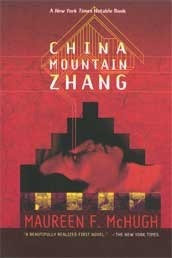 China Mountain Zhang is a book people have pretty much telling me to read for the last twelve years. (PEOPLE! You're telling it wrong!) Nevertheless, when I came to it, I knew pretty much nothing about the book. It turned out to be a very clever, beautifully told imagined future in which China is the dominant world power, and society is communist.
China Mountain Zhang is a book people have pretty much telling me to read for the last twelve years. (PEOPLE! You're telling it wrong!) Nevertheless, when I came to it, I knew pretty much nothing about the book. It turned out to be a very clever, beautifully told imagined future in which China is the dominant world power, and society is communist.
For the most part, through the novel, we follow Zhang, a young closeted gay American Born Chinese (ABC) engineer, and his uneven career path. He loves living in New York, and yet a difficult situation with his boss's daughter pushes him on another path, to the ends of the earth and even the "holy grail" of gaining an education in China itself. The idea of what success is and whether it can equate to happiness is a strong theme throughout, and it is very clear that the fact that he and so many of his friends have to hide their sexuality means that their very definitions of a successful life are often at odds with what society expects (the most highly paid jobs, for example may be in locations that would make any kind of love life physically impossible because there is no privacy).
Zhang's other secret is that his mother is Hispanic, but his parents used gene modification so that he does not appear to be mixed race, and his papers are doctored to make him appear fullblood Chinese. The emphasis on Chinese as the dominant culture is one of the most fascinating aspects of the novel, and I particularly enjoyed the way language was used to express this – McHugh's own linguistic experience lended confidence to the prose, and I love it when fiction delves into the oddities and subtleties that come from characters being bi-lingual, and using particular aspects of language to get ideas across.
As well as Zhang's story, we also get interludes through the eyes of other characters, who have tangential connections to Zhang, though not necessarily in a strong narrative sense. This very much expands the world that Zhang lives in, and makes it feel like a credible and three dimensional future. I wasn't sure what to expect from these pieces, but I did enjoy the slight connections made between them and the central story without particuarly craving a greater significance. The wiki page about the novel says that these extra stories are "following characters progressing from arrogant outsiders to finding a place in society" which wasn't something that occurred to me as I was reading them, but I don't especially agree with that. Outsiders finding a place in society, yes, but I didn't interpret any of them as especially arrogant. They were all very rich, well-conveyed characters who obviously had flaws and blind spots and confidences and skills, but not in an obnoxious sense.
Overall the book is very likeable and readable, page turning despite not being about any particular epic turning points or revelations: it is simply the story of a man building a future for himself in a world different to our own, and I can see it would be very much the kind of science fiction that a non SF reader might enjoy, if they could get past the notion that it does not tick any of the boxes that an outsider thinks SF is all about.
So… that's five out of thirty in this list, over five years. I really need to pick up the pace on this.
GEEK GIRL READING LIST
1. Cyteen – CJ Cherryh
2. The Sparrow – Mary Doria Russell
3. Slow River – Nicola Griffith
4. China Mountain Zhiang – Maureen McHugh [read 2010]
5. Wildseed – Octavia Butler
6. Oryx & Crake – Margaret Atwood
7. The Handmaid's Tale – Margaret Atwood
8. Dragonflight – Anne McCaffrey
9. In the Garden of Iden – Kage Baker
10. Her Smoke Rose up Forever – James Tiptree Jr
11. The Snow Queen – Joan D Vinge
12. Where Late the Sweet Birds Sang – Kate Wilhelm
13. Bride of the Rat God – Barbara Hambly
14. Northhanger Abbey – Jane Austen [Read 2008]
15. City of Pearl – Karen Traviss
16. Life – Gwyneth Jones
17. The Year of our War – Steph Swainston
18. Maul – Tricia Sullivan
19. Queen City Jazzy – Kathleen Ann Goonan
20. Brown Girl in the Ring – Nalo Hopkinson
21. Archangel Protocol – Lyda Morehouse [Read 2006]
22. Spin State – Chris Moriarty
23. Adventures in Time and Space with Max Merrriwell – Pat Murphy [Read 2010]
24. Sarah Canary – Karen Joy Fowler
25. Stable Strategies and Others – Eileen Gunn
26. Sexing the Cherry – Jeanette Winterson
27. Catherine called Birdy – Karen Cushman
28. Beggars in Spain – Nancy Kress
29. Dreamsnake – Vonda McIntyre
30. Tea with the Black Dragon – R A McAvoy [Read 2006]
The Hundred Thousand Kingdoms, by N.K. Jemisin
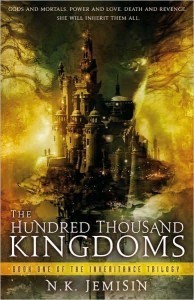 The trouble with discussing the books I read on the Galactic Suburbia podcast (as I did with this one in episode 20) is that I forget to blog about them – or I remember, but the sticky note gets ignored for ages because I feel like I've already discussed it…
The trouble with discussing the books I read on the Galactic Suburbia podcast (as I did with this one in episode 20) is that I forget to blog about them – or I remember, but the sticky note gets ignored for ages because I feel like I've already discussed it…
I didn't want to let The Hundred Thousand Kingdoms go without comment, though, because it's one of the most interesting, original and intelligent fantasy novels I've read in a long time. It works against so many of the cliches and expectations of fantasy fiction, and while I think it doesn't always succeed at everything it tries to do (it is, after all, a first novel), it made me genuinely excited for the genre.
For a start, it's a complete story. Jemisin is writing a trilogy, but she has chosen to interpret that has being three individual novels set in different parts of the same world, with different protagonists and narrative threads. This is something I would love to see more of, as there is really nothing more satisfying than reading a novel that is complete in and of itself.
The premise of the novel is that the magical royal family of the hundred thousand kingdoms all live together in a city called Sky, forming an odd culture because only members of their family can live there – and so everyone from the king to the servants are all linked by blood. Part of this family's power comes from the enslavement of the gods, who are trapped in mortal bodies. Portraying gods as characters is always a difficult task, as with any non-human race: if they are too alien it is hard for a reader to connect with them and their priorities, but if they are too human it seems inauthentic. I was impressed at the portrayal in this novel of various eternal creatures, and I did appreciate that while we have a clear cut heroine and some clear cut villains (everyone who wants to do bad things to the heroine), the story made it clear and believable that the culture had a different morality to our own. Many gods-as-characters in fantasy worlds are a little too amusing or shiny, like the children's book versions of Zeus or Athena. I loved that the gods of Sky were so raw and complex and unpredictable, with humans only really able to understand them a small piece at a time.
Yeine is one of the Arameri, the family of Sky, but thanks to her mother's rebellion and exile, she has been raised far from the crazy. Now, with her mother's death, she has to travel to Sky and finds herself instantly swamped in a war for succession, in which she is intended to be a highly expendable pawn. I love court politics and I enjoyed reading about the complex and poisonous dipomacy Yeine had to learn to manage. I also enjoyed the very weird and unusual romance between Yeine and a demon, and the friendships that she formed. It is the gods rather than her own family that she feels a deeper kinship with, and that she longs to understand.
My hesitations with the text come largely from the structure: because we first see Yeine when she is arriving at Sky and only briefly visit her home, we have to be told a lot about her motivations and what is important to her, rather than seeing it – ultimately we have to rely on the fact that anyone would be upset if someone else threatened to destroy their home, because we as readers don't really have much of an emotional attachment to where Yeine comes from, or the people who are dear to her in her old life. The only one we really learn a lot about is her mother, who is dead at the beginning of the story. Having said that, the offscreen relationship between Yeine and her mother, her hunger to learn why her mother left Sky and the way she pieces that history together was one of my favourite of the storylines.
Likewise, we have to be told that Yeine is a warrior from a warrior culture, and yet that doesn't really come across in how she acts in Sky, where of course her physical skills aren't likely to be much use because she is surrounded by people who can manipulate magic. The whole point of the story is that she is out of her element, and while I did appreciate that and I liked that she came across as quite human and vulnerable but slowly taking on the characteristics of the Arameri, I didn't feel like her former existence as a warrior was really relevant enough to the story as it was told.
One criticism I have heard from other reviewers is the narrative style – Yeine tells her own story in first person, but it is often framed by her own commentary, meandering intercessions and explanations, just as if she is speaking the story aloud and occasionally tells bits in the wrong order and has to backtrack, and so on. I actually really enjoyed this aspect. I can see how people preferring a more straightforward narrative might be irritated by it, but I thought it was a good way to learn more about the protagonist, and I found it quite endearing.
At a prose level, The Hundred Thousand Kingdoms is exceptional. The language is just lovely, and not in an over-flowery kind of way. It is just beautifully told, and while I am rarely one to value pretty prose over the actual story, I did find that it more than papered over any of the novel's weaker aspects. It helps that, along with the elegant narrative, the dialogue is sparkling, and there are some marvellous sensual scenes. Just about everyone has sexual chemistry with everyone else in this book, and while there is the squicky element of most of them being related to each other, it wasn't a problem for this former classics student…
Also worth noting that both the author and protagonist are POCs – and thus part of the exciting wave of greater diversity in science fiction and fantasy that seems to be happening at the moment. I look forward to a time when this isn't something worth noting, but in the mean time, having a non-white protagonist is still a rarity in traditional fantasy (though to be fair there isn't a lot traditional about this book) and I think it's important to have books like this that show that, well, of COURSE a fantasy novel doesn't have to be all about white people.
More than anything, this is a novel of Ideas as well as character, and that gives the story of Yeine and Sky something of a science fictional sensibility. I was so entranced by what the book was doing, and how it was being told, that I only really perceived its flaws after the fact, which suggests to me that they are minor, and not really worth worrying about. I am excited to read the next book, even though I know that it is not about Yeine and the continuance of her story, purely because I want to see what the author is going to do next, as an exciting voice in fantasy fiction.
November 24, 2010
Selling Sexist Stereotypes to Six Year Olds
(via Blue Milk)
So, this one gets me where I live. The overly gendered toy market and the advertising that goes along with it is a constant frustration for me, as a mother of two girls. We're not just talking about pink or blue packaging here. There is a huge divide between the products created for girls and those for boys, and this vid shows something about how confronting that can be for parents who actively think about this stuff.
Boys, in Toydepartmentworld, get to be warriors or builders. Even the building toys that are mostly directed at them are often quite violent in the story that goes along with them, or the advertising associated with them. Girls, meanwhile, get to be sparkly princesses or shopping queens.
The ads targeted at children are gross parodies of the gendered advertising aimed at men and women. The whole thing seems designed to create the four wheel drive and fashion magazine purchases of the future. Which, of course, it is.
The vid quite rightly points out that pushing these kind of tight, limited gender boxes on children at such an early age can have quite awful and far-reaching consequences. At a time when they are learning how to be human and how to find their place in society, a time when everything they learn gets soaked into their consciousness like a sponge, two of the biggest messages they are internalising is that boys must be strong, violent and controlling, and that girls must be pretty, glamorous and domestic.
It's not just advertising. Of course it's not just advertising. Our children are absolutely complicit in this rigid stereotyping of genders. I feel at times like de-brainwashing Raeli from the ideas about gender she and her friends come up with in the playground is a full time job. It's like they spend their entire lunch break sitting around and wilfully constructing the most limited and small minded social constructs for themselves.
Already, at three and four and five, they voice messages about what boys and girls are SUPPOSED to do, how they are SUPPOSED to behave, and what is allowed to them. I've had to deconstruct some ridiculous theories, and drives to and from school often contain conversations about whether boys can wear pink, whether boys can have long hair (her Dad & grandfather have long hair and she has never thought this strange, but if she sees a man in the street with a ponytail she gets confused. This makes no sense to me) but also odd things like whether girls are allowed to wear things with stars on (wtf?).
I do my best, though I tend towards moderation rather than militance. I try to respect her tastes and interests, while encouraging a wider variety of options. Not that there are many options, because there are so few gender-neutral ANYTHINGS in a child's universe. At nearly six years old, Raeli can spot something marketed at boys a mile off, and she won't have a bar of it. I bought a pair of Batman t-shirts yesterday because they were cool, and Raeli is crazy about Batman cartoons – one was plain black with the bat symbol on it, and I thought it would work just as well as a Batgirl shirt. The other was dark blue with the Bat-family on the front. Raeli liked the picture, but she decided no, those were boy shirts. Of course, they were, but I had been hoping she would like them anyway! No such luck.
I'm hoping by giving them to Jemima instead, Raeli will get jealous and ask for them back. Look at me, encouraging competitive female behaviour!
Mostly we work on Raeli as subversively as we can, encouraging her in a variety of interests and tastes, and jumping on any sign of 'girlclone' attitude when it emerges. I'm not prepared to be a those parents who forbids Barbie from the house or whatever (luckily I haven't had to deal with Bratz because I honestly don't think I could stomach it) but I do try to pick and choose things like Barbie quite carefully, and think about which messages the dolls send. Even if buying presents for birthday parties, I'd rather give a Barbie who has a job than one who is there to shop until she drops.
I also loathe the Barbie movies, mostly because the characters are kind of creepy looking, especially the older women (who look like Barbie with creases painted on), but I have let her take them out from the library (because she's allowed ANYTHING from the library) I did buy Barbie and the Three Musketeers for Raeli last Christmas because I still think it's awesome and surprisingly subversive that they told the story with an all-female cast, but this year she wants Barbie and the Nutcracker and A Mermaid's Tale. She puts like 4 things on her Christmas list, she's not exactly being unreasonable. The stories aren't awful, and the girls in them are quite active. I'm going to suck it up and let her have them.
She's also getting the Powerpuff Girls movie. And a Mister Maker book. And a trampoline. I won't restrict her interests, but I do work really hard to make sure she has as wide a variety of influences as possible. I was delighted this year by two major wins – she started agreeing to wear trousers (possibly this coincided with me starting to do the same) and she officially went "out" of her PINK IS AWESOME phase also I'm pretty sure she is actually pretending to not like pink that much because she wants to stand out from her friends. This is a lie I am happy to support because how awesome is it that she actually wants a point of difference?
How many kids feel alienated from their peers because they don't feel like they fit the rigidly limited definitions of gender? How many pretend to love the things they are "supposed" to love? How many beg their parents for particular toys, because they're popular? How many hide the interests they actually have, or never even discover them because X is for boys and Y for girls? That's without even getting into the hellish problems that must be faced by kids for whom gender isn't an easily identifiable binary.
School programs work pretty hard to be gender neutral, as does an awful lot of culture aimed at children: TV shows, books, etc. Even those aimed squarely at boys or girls often try to ensure there is wider appeal in them, or that there are strong role models of either gender available. The toy industry, though, lags way behind. Merchandising is often far more starkly gendered than the shows or movies that inspired them.
The Harry Potter books and movies have mass appeal for girls, but you wouldn't know it from the toys. Harry Potter Lego rarely features female characters, and when it does, they are severe minorities – might get one in a huge Lego set, but almost never can buy individual girl characters. I was outraged to see that the truly awesome Quidditch Lego set only featured male players. Where's my Angelina Johnson mini-fig? The most common characters I see on shelves are Harry, Draco and Snape. All awesome characters, but… (the other big Harry Potter Lego set at the moment is the burning Weasley house – apparently Ginny is there to be rescued.)
There are very few male characters in the toys aimed at girls, and very few female characters in the toys aimed at boys – which not only helps to segment the genders but also limits their storytelling possibilities. It means their imaginary worlds are going to be weirdly segmented – is it any wonder so many classes end up with boys on one end of the playground and girls on the other? Is it any wonder so many teenage boys and girls have no idea how to talk to each other? Or that so many "romantic" stories aimed at adults seem predicated on the idea that men and women are different species?
We're working on our own idea of acceptable compromises. We encourage Raeli in loving AstroBoy and Batman along with Disney princesses, and I do my best to find Lego and other building toys that are coded as neutrally as possible, so she won't back away from them. Her Dad encourages her interest in robotics. Thanks to trock, she has got over her fear of Daleks, though I fear the Sontarans (Humpty Dumpty men!) will always be terrifying to her. She shares loads of interests with her boy friends, even as she and her girl friends play pop stars or fairies. Oh, and yes, she doesn't watch kids shows on commercial TV – because even a three minute ad slot can aggressively undo weeks or months of good work.
The government has done a good job in restricting the junk food ads in those time slots, but they haven't gone far enough. The gendered advertising aimed at children is quite despicable. It's not a good enough defence to say that this is what kids want, and this is the marketing that appeals to children. Of course it is. Do you know what else appeals to children? Eating sweets until they're utterly sick. Red cordial. Going on the jumping castle right after eating birthday cake.
I'm prepared to have my daughter play with Barbies, but I don't want her exposed to media that tells her that the point of Barbie is the hair, the clothes, and the looking pretty. The movies, creepy as they are, don't do that. They tell solid stories with girls as the main protagonists, which allow female characters to be active. When Barbie movies have better gender politics than the advertising of the dolls – isn't that a problem?
Come to that, why is it that companies are allowed to market products to young children ANYWAY? If they're going to do so, which is in itself morally dubious, shouldn't they have the same responsibility as the makers of children's programming to include educational content, and to actually think about the messages they are sending to young minds? Beyond 'make them beg their parents to buy this thing.'
What I want for my girls is to have as many choices as possible. They're going to face sexism, sure – worst of all, they'll probably be complicit in it at various stages of their lives, no matter how hard I try to educate them. How is it that toy advertisers and manufacturers are being allowed to perpetuate incredibly old fashioned and confining social values for our kids? It feels like there are whole generations being actively trained to form a (yet another) backlash against feminism. Because, of course, institutionalised gender roles are good for business.
This is why I could never stomach Mad Men. The world it portrays never completely went away, and everything about the advertising industry seems geared to bring it back, worse than ever.
Galactic Suburbia Episode 21
New Episode now available for streaming, direct download or from iTunes!
In which we work, play, shake up our format a little (gasp!) and cover the life & death of magazines, the changing face of the industry, respect for non fiction, sexual harassment, rants, reboots and as usual, books, books and more books. Also a few sneaky clues about what Twelfth Planet Press is publishing next year!
News
Realms of Fantasy is back, again…
Escape Pod Expands:
"We have been pushing to expand what Escape Pod does, adding an SF blog and distributing our stories via magazine format. We're also becoming a pro market, and hope to keep paying our authors pro rates well into 2011 if the donations make it possible."
Cheryl Morgan talks about paying for reviews as semipro
On the Cooks Source scandal and seeing stuff on the internet as 'public domain'
Jim C Hines on reporting sexual harassment in SF/F
Old men complaining? When you get older, do you by consequence lose your sense of wonder? Just simply because you've read everything? And is/should all SF be aimed/written for the 60 year old man?
Jason Sanford responds
New Buffy Reboot
New Friend of the Podcast: The Writer & the Critic (Mondy & Kirstyn)
Rambly Discussion
Books that aren't marketed as being a part of a series…
Publishing, deadlines, and attitudes thereto…
Chat, rants and backpedalling…
What Culture have we Consumed?
Alex: Blameless, Gail Carriger; The Devil in Mr Pussy, Paul Haines; Women of Other Worlds, ed. Helen Merrick and Tess Williams; Bold as Love, Gwyneth Jones; Day of the Triffids (2009 BBC production)
Alisa: works too hard, and also FRINGE
Tansy: To Write Like a Woman, Joanna Russ; Marianne, the Magus & the Manticore by Sheri S Tepper; Sourdough & Other Stories, Angela Slatter; China Mountain Zhang, Maureen McHugh, Mists of Avalon movie
Please send feedback to us at galacticsuburbia@gmail.com, follow us on Twitter at @galacticsuburbs, check out Galactic Suburbia on Facebook and don't forget to leave a review on iTunes if you love us!
November 21, 2010
Best Australian Short Spec Fic 2010
We'll be posting our Best Of The Year lists over at Last Short Story shortly – which means it's time to put together my Australian list!
2010 was a great year for short fiction – a lot more fantasy and slipstream than SF, especially on Australian shores. Plenty of Aussie authors were getting published, both locally and overseas, and there were a few excellent single author collections from Kaaron Warren, Marianne De Pierres and two from Angela Slatter – though with the exception of Sourdough, they were mostly reprints. It's certainly nice to see more Australian women having their work collected, something that has been a shameful omission in previous years.
My Absolute Favourite Spec Fic stories by Australian Authors in 2010 were:
Margo Lanagan, "The Miracle Aquilina," Wings of Fire
Thoraiya Dyer, "Yowie," Sprawl
Elizabeth Carroll, "The Duke of Vertumn's Fingerling," Strange Horizons
Also Highly Recommended:
Peter M Ball, Bleed, Twelfth Planet Press
Peter M Ball, "One Saturday Night, With Angel," Sprawl
Thoraiya Dyer, "The Company Articles of Edward Teach," The Company Articles of Edward Teach/The Angalien Apocalypse
Dirk Flinthart, "The Best Dog in the World," Worlds Next Door
Margo Lanagan, "A Thousand Flowers," Zombies vs. Unicorns
Garth Nix, "To Hold the Bridge," Legends of Australian Fantasy
Angela Slatter, "Lost Things," Sourdough and Other Stories
Angela Slatter, "Lavender & Lychgates," Sourdough and Other Stories
Angela Slatter, "Under the Mountain," Sourdough and Other Stories
Angela Slatter & LL Hannett, "The February Dragon," Scary Kisses
Cat Sparks, "All the Love in the World," Sprawl
Kim Wilkins, "Crown of Rowan," Legends of Australian Fantasy
Honourable Mentions:
Peter M Ball, "L'esprit de L'escalier," Apex
Peter M Ball, "The Clockwork Goat and the Smokestack Magi," Shimmer
Deborah Biancotti, "Never Going Home," Sprawl
Simon Brown, "Sweep," Sprawl
Stephanie Burgis, "Speaking English," Belong
Stephanie Campisi, "How to Select a Durian at Footscray Market," Sprawl
Marianne De Pierres, "Mama Ailon," Glitter Rose
Paul Haines, "Her Gallant Needs," Sprawl
Jennifer Moore, "United," Belong
Angela Slatter, "The Dead Ones Don't Hurt You," The Girl With No Hands
Angela Slatter, "Brisneyland By Night," Sprawl
Angela Slatter, "The Shadow Tree," Sourdough & Other Stories
Angela Slatter, "Dibblespin," Sourdough & Other Stories
Angela Slatter, "The Story of Ink," Sourdough & Other Stories
Angela Slatter, "The Bones Remember Everything," Sourdough & Other Stories
Anna Tambour, "Dreadnought Neptune," Asimov's
Kaaron Warren, "Hive of Glass," Baggage
Kaaron Warren, "Sins of the Ancestors," Dead Sea Fruit
Sourdough & Other Stories, by Angela Slatter
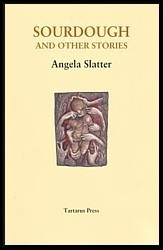 Like Diana Comet, this is a collection which really doesn't call to have the individual stories reviewed. Sourdough is about three steps closer to being a mosaic novel than Diana Comet is, and while a few of the stories have been published elsewhere (though the majority are new to this collection) the collection is stronger as a whole than any of its individual parts.
Like Diana Comet, this is a collection which really doesn't call to have the individual stories reviewed. Sourdough is about three steps closer to being a mosaic novel than Diana Comet is, and while a few of the stories have been published elsewhere (though the majority are new to this collection) the collection is stronger as a whole than any of its individual parts.
Angela Slatter's short fiction tends towards fairytale concepts – often interrogating the 'happy ever after' and 'romantic' sensibilities associated with those tales to reveal the sticky, mean and bitter undercurrents that run through them. The first few stories very much follow in that tradition – but as the book continues, the stories begin to build upon each other, with characters crossing from one story to another, and whole narratives occuring in bits and pieces. The effect is a build up of tensions and investment from the reader, and it made the last few stories in particular really engrossing. The world that serves as background to these stories begins as a fairly generic 'place where fairytales happen' but later expands to include familiar buildings, cities and historical events. It might emerge only piece by piece, but it takes on a very real quality.
What I noticed most was that every story was narrated in first person by a different female character. Most of these were quite young, though a few were mothers. The effect was rather interesting – I'm used to more of a variety of character types in anthologies and collections, particularly with first person stories. It meant this was very much a story about women, particularly the plucky young girl/princess archetype who is so prevalent in fairytales. Slatter's young women are as a group far more damaged, brittle and endangered than the shiny Disney heroines people might expect, and I liked the fact that we often got to see stories from more than one perspective, as many of the protagonists return older and/or wiser in later stories.
I very much liked "The Shadow Tree," "Dibblespin," "The Story of Ink" and "The Bones Remember Everything," but my absolute favourites were "Lost Things," "Lavender and Lychgates," and "Under the Mountain."
This is a beautifully packaged book which calls to be appreciated and re-read for the many layers that lie within.
November 19, 2010
Tea in the TARDIS
My friend ![[info]](https://i.gr-assets.com/images/S/compressed.photo.goodreads.com/hostedimages/1380439078i/974451.gif) godiyeva is the best enabler in the world when it comes to high tea – every time someone has a win, she declares it is high tea time, regardless of whether we can actually schedule an outing (sadly the school pick up times of our children makes tea a very difficult possibility). I think this year we are several high teas behind, especially since I just found out that I won an Arts Tasmania grant for FURY, to go with my Australia Council grant. People really want me to write this book! I'm also excited that the excellent new Tassie YA writer Kate Gordon got a grant too – luckily we had already planned to meet for coffee tomorrow, now we can add cake to the menu! Celebration cake!
godiyeva is the best enabler in the world when it comes to high tea – every time someone has a win, she declares it is high tea time, regardless of whether we can actually schedule an outing (sadly the school pick up times of our children makes tea a very difficult possibility). I think this year we are several high teas behind, especially since I just found out that I won an Arts Tasmania grant for FURY, to go with my Australia Council grant. People really want me to write this book! I'm also excited that the excellent new Tassie YA writer Kate Gordon got a grant too – luckily we had already planned to meet for coffee tomorrow, now we can add cake to the menu! Celebration cake!
Meanwhile, my friend Kaia in Sweden only recently discovered that when Australians and Brits talk about having their tea, they don't necessarily mean drinking a cup of this:
Instead, we mean eating an evening meal. The origin of the term is of course the nursery tea which involves cakes, crumpets, toast and jam, or sandwiches, served to the kids nice and early in the evening, possibly in the nursery with Nanny so the parents don't have to make their oyster stew or roast whelk child-friendly (oh, how I sympathise). According to Jane Brocket in her splendid book Cherry Cake and Ginger Beer, tea gets higher and higher the later in the evening it is, and you are allowed to add things like sardines or sausages and finally, if it's eight o' clock, you can call it supper instead and have bacon and eggs with it.
High tea, on the other hand, is best served in a fancy or old fashioned hotel, with pretty bite-sized desserts on a tiered cake stand. Our favourite in Hobart is still the one at Hadley's, which offers scones on the top layer, pretty sandwichable savouries on the bottom layer, and delicious tiny cakes in the middle.
On the other hand, I'm pretty sure that tea in the TARDIS is automatically high, regardless of whether there are sardines involved. In fact, I would venture to say that this particular Tea is not only High. but Far:

